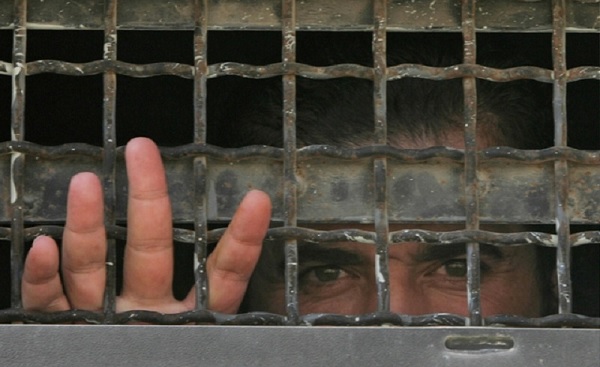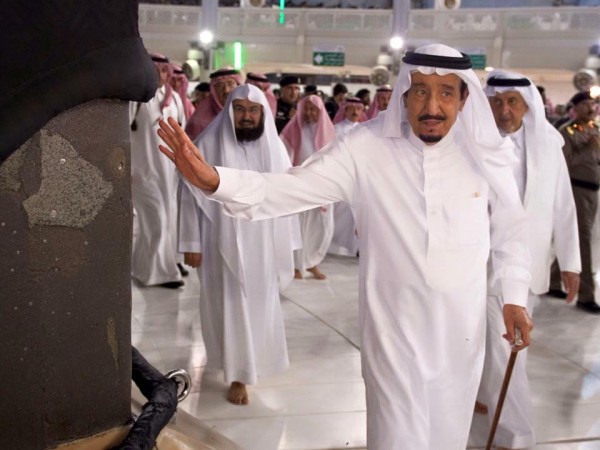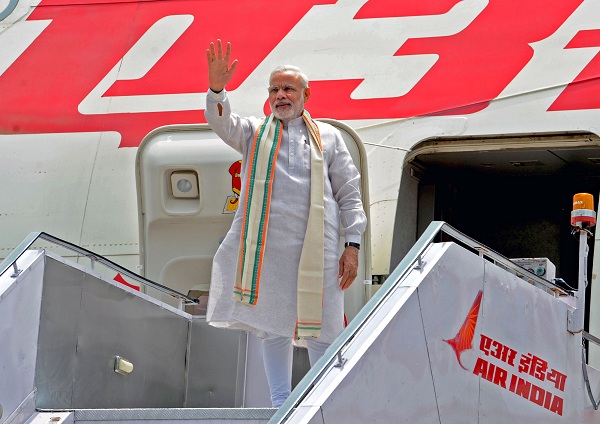
by admin | May 25, 2021 | Muslim World
 Ramallah (IINA) – Four Palestinian detainees in Israeli jails have entered into a hunger strike in protest against their administration detention, while a fifth detainee embarked on a hunger strike in protest of being held in solitary confinement, WAFA reported.
Ramallah (IINA) – Four Palestinian detainees in Israeli jails have entered into a hunger strike in protest against their administration detention, while a fifth detainee embarked on a hunger strike in protest of being held in solitary confinement, WAFA reported.
Kareem Ajwa, an attorney with the Detainees and Ex-Detainees Commission, said the four detainees, namely Sami Janazreh, Imad Batran, Abdur-Rahim Tawayfeh, and Abdul-Ghani Safadi have recently embarked on a hunger strike in protest of being held under the Israeli administrative detention, without a charge or trial.
The fifth detainee, Nahar Saadi, has also begun a hunger strike to protest of being held in solitary confinement for two years.
There are more some 500 Palestinian detainees being held under administrative detention, a controversial Israeli practice that allows detention of Palestinians without charge or trial for up to six-month intervals that can be renewed indefinitely.
Palestinian detainees have continuously resorted to open-ended hunger strikes as a way to protest their illegal administrative detention and to demand an end to this policy, which violates the international law.

by admin | May 25, 2021 | Muslim World
 Ankara, (IINA) – The number of refugees trying to reach Europe by crossing by sea from Turkey to Greece has fallen sharply since the EU-Turkey refugee deal came into effect last week, Anadolu Agency reported.
Ankara, (IINA) – The number of refugees trying to reach Europe by crossing by sea from Turkey to Greece has fallen sharply since the EU-Turkey refugee deal came into effect last week, Anadolu Agency reported.
Turkey and the EU reached an agreement, which came into effect on March 20 to stop refugee flows into Europe.
Under the deal, refugees trying to enter Europe illegally will not get a chance to be resettled in the EU, as all new irregular migrants crossing from Turkey to the Greek islands as of March 20 will be returned to Turkey.
On March 18 and 19, before the deal took effect, nearly 2,000 refugees were caught in the Aegean Sea. However, on March 20-27, only 795 refugees were captured.
In 2015, more than 800,000 refugees crossed into Europe, and the Coast Guard captured 91,611 illegal immigrants, according to data compiled by Anadolu Agency.
Over 5,500 refugees were captured this January, 8,739 captured in February and 7,842 were caught in March, an overall of 22,000.
Turkey is hosting the largest number of Syrian refugees in the world and has spent more than seven billion euros ($7.7 billion) meeting their needs, according to European Commission figures released last year.

by admin | May 25, 2021 | Muslim World
 Minneapolis, (IINA) – After the Belgium terror attacks, Muslim leaders in the United States have been meeting with law enforcement authorities over fears of possible hate crimes and an anti-Muslim backlash, International Business Times reported.
Minneapolis, (IINA) – After the Belgium terror attacks, Muslim leaders in the United States have been meeting with law enforcement authorities over fears of possible hate crimes and an anti-Muslim backlash, International Business Times reported.
After the attacks in Belgium, the city’s Muslim leaders met with law enforcement, who wanted to send the message we’re here to protect you against hate crimes.
Muslim American groups like the Council on American-Islamic Relations (CAIR) report a huge uptick in bias crimes against Muslims in recent months, including a 7th grader in Hayward, California, who said last week she was bullied and called a terrorist in school.
Some worry recent attacks overseas are creating an anti-Muslim backlash here at home. “School bullying, teacher discrimination, all sorts of issues stemming from schools all across the Bay Area, especially in the last 5, 6 months where the political rhetoric has reached really, really scary levels.”
Somali Americans like community organizer Abdirizak Bihi say that rhetoric from candidates like Donald Trump and Ted Cruz — is being used as ammunition by terrorist groups.
The concern stretches across the Muslim American community, as the heated campaign rhetoric shows little sign of cooling down.

by admin | May 25, 2021 | Opinions

Custodian of the Two Holy Mosques King Salman
The scenario in the Middle East is changing fast and at the centre of it is neither the United States or the coalition of countries it leads nor Russia but Saudi Arabia, the Wahabbi country which had so long acted as the source and ultimate prop of many Islamist activities in the Arab world. Continuous crash of oil prices and the rise of the Islamic States (IS) have forced Riyadh to move away from the US sphere of influence and start charting out its own course.
Notwithstanding the recent execution of Sheikh Nimr-al-Nimr, the opposition Shiite cleric, it can be said with a fair amount of certainty that Riyadh is now trying to come out of its self-created cocoon.
Two recent developments point out that Saudi Arabia is prepared to give Russia a space in Middle Eastern affairs. First, preparations are on for Saudi King Salman’s visit to Russia later this year. Secondly, the Saudi deputy crown prince and defence minister, Mohammed Bin Salman, visited Russia last June. Following closely on this, Turki-al-Faisal, the former intelligence chief, stated that Russian actions in Syria were more effective than those of the US and that Russia’s views merit attention and respect.
But it would be wrong to presume that Saudi Arabia is aligning with Russia on the Syrian question. Riyadh is worried about Iranian expansion in the Middle East and the US taking a soft line on the country after the nuclear agreement with Tehran. Saudi Arabia will now try to dominate the Middle East scenario on its own and in keeping with this line, Turkish President Recep Erdogan visited Saudi Arabia on December 30, 2015. Riyadh has also built up a strong coalition comprising the oil rich Arab countries.
But, will Saudi Arabia be really able to dominate the Middle Eastern scenario? Objective conditions preclude such a possibility. There are unmistakable signs that willy-nilly it is tilting towards Russia although that may not be the wish of the Saudi Royal household. Two principal reasons for it are the military fatigue in Yemen and a resource crunch due to Syria. There will be a $100 billion deficit in Saudi Arabia’s budget for 2016. Last year, the budget deficit was 21.6 percent of the GDP and the country barely managed to survive by earlier petro dollar savings.
What will, however, affect the Middle East scenario the most is the decision by the Saudi Arabian Monetary Agency to withdraw $70 billion from foreign investment fund assets last summer. This will certainly cut down on siphoning of money to terror related organizations through official channels. Moreover, the financial health of Saudi Arabia’s friends in the region are also not good. Reliable estimates put the budget deficits of Middle Eastern oil exporting countries in the next five years around $1 trillion.
It is difficult to predict how long Saudi Arabia can keep up pressure in Yemen or Syria with such a shaky financial condition. It may not go bankrupt in the near future but the Saudi royal family must look for avenues to push up prices of oil, which came down to less than $50 a barrel last September, a sharp nose-dive from $103 in September 2014.
Here lies the raison d’ etre for Saudi overtures to Russia for cooperation. Riyadh is now looking for an “alliance for oil” partnership with Russia which will also give it a foothold in the Eurasian Economic Union. With this end in view Prince Salman had talks with Russian President Vladimir Putin on the sidelines of the Sochi Olympics in 2014. This was followed by the Russian energy minister’s talks with his counterparts in Saudi Arabia and Iran.
Three consecutive IS attacks on Saudi mosques have reportedly convinced King Salman about the need for fashioning a new security strategy that puts a premium on choosing an independent course of action, away from US tutelage. Even on Yemen, Saudi Arabia is now open to negotiations. Although Riyadh still demands removal of Bashr-al-Assad as a precondition for ushering in of peace in Syria, yet Brigadier General Ali Mamlouk, head of the Syrian National Security Bureau, was hosted in Riyadh by no less than the deputy crown prince last July.
Russian military intervention in the Middle East has induced a new type of assessment among all the stakeholders. The US led coalition’s attack on the IS has undergone a qualitative change. The US attacks are now hitting the IS really hard. Meanwhile, to establish its credibility with international powers King Salman has fired Prince Bandar, a former intelligence chief, who had his fingers in many CIA-orchestrated operations. Now, a secret Saudi Arabian document has surfaced which shows that the King Salman-led administration has instructed its Middle Eastern embassies not to fund Syrian rebels any more.
Does this really portend a fundamental shift in terror-related Middle Eastern politics?
(Amitava Mukherjee is an Indian journalist and commentator. The views expressed are personal. He can be contacted at amukherjee57@yahoo.com)

by admin | May 25, 2021 | Economy, News

Prime Minister, Narendra Modi departing for his two-day visit to the United Arab Emirates (UAE) from New Delhi on August 16, 2015.
New Delhi:(IANS) Prime Minister Narendra Modi has called for a “comprehensive strategic partnership” with the UAE and warned against “outside interference” in the Middle East.
Ahead of his two-day visit to the United Arab Emirates starting on Sunday, Modi also described the UAE as a “Mini India” and vowed to build a “regular and effective cooperation in … security challenges”.
In an interview to the Khaleej Times, the Indian leader said that the Gulf region was “vital for India’s economic, energy and security interests.
“I have begun my regional engagement with the UAE. This tells you the importance I attach to the UAE. We have resolved to sustain regular high level engagements and build a strong and comprehensive strategic partnership.”
Without naming any specific country or countries, he said India was “saddened and worried to see violence and instability in the region.
“I have always believed that regional or bilateral problems are best solved by the countries involved. We have often seen the consequences of outside interference.”
Modi, who will be the first Indian prime minister to visit the UAE in 34 years, lavished praise on the progress made by a country which is home to a large number of Indian expatriates.
“I have been hearing about the progress made by Dubai for years… This would be my first visit to the country. I always thought how this paradise could come up in a desert? What vision! What remarkable skill!”
The prime minister said the 2.6 million Indians who live and work in the UAE had made that Gulf country a “Mini India”.
“The Indian community has been embraced with such warmth in the UAE. The way the two communities work together represents a special bond.
“They have set an example for how an expatriate community can become a part of their resident country’s development journey.”
Saying India has emerged as one of the major global powers, Modi said that India and the UAE have everything to be a top priority for each other.
“The Gulf region is vital for India’s economic, energy and security interests…
“I would like to see a truly comprehensive strategic partnership evolve between our two countries. I want to see the UAE as our foremost trade and investment partner…
“We would build regular and effective cooperation in a full range of security challenges. Our armed forces would engage with each other more.”

 Ramallah (IINA) – Four Palestinian detainees in Israeli jails have entered into a hunger strike in protest against their administration detention, while a fifth detainee embarked on a hunger strike in protest of being held in solitary confinement, WAFA reported.
Ramallah (IINA) – Four Palestinian detainees in Israeli jails have entered into a hunger strike in protest against their administration detention, while a fifth detainee embarked on a hunger strike in protest of being held in solitary confinement, WAFA reported.



